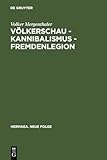Völkerschau - Kannibalismus - Fremdenlegion : Zur Ästhetik der Transgression (1897-1936) / Volker Mergenthaler.
Material type: TextSeries: Hermaea. Neue Folge : Germanistische Forschungen ; 109Publisher: Tübingen : Max Niemeyer Verlag, [2011]Copyright date: ©2005Description: 1 online resource (270 p.)Content type:
TextSeries: Hermaea. Neue Folge : Germanistische Forschungen ; 109Publisher: Tübingen : Max Niemeyer Verlag, [2011]Copyright date: ©2005Description: 1 online resource (270 p.)Content type: - 9783484151093
- 9783110940978
- Cannibalism in literature
- German literature -- 19th century -- History and criticism
- German literature -- 20th century -- History and criticism
- Imperialism in literature
- Altenberg, Peter / Ashantee
- Ewers, Hanns Heinz / Die Mamaloi
- Grenzüberschreitung
- Jünger, Ernst / Afrikanische Spiele
- Kannibalismus ‹Motiv›
- LITERARY CRITICISM / European / German
- 830.935 22
- PT405 .M438 2005eb
- online - DeGruyter
- Issued also in print.
| Item type | Current library | Call number | URL | Status | Notes | Barcode | |
|---|---|---|---|---|---|---|---|
 eBook
eBook
|
Biblioteca "Angelicum" Pont. Univ. S.Tommaso d'Aquino Nuvola online | online - DeGruyter (Browse shelf(Opens below)) | Online access | Not for loan (Accesso limitato) | Accesso per gli utenti autorizzati / Access for authorized users | (dgr)9783110940978 |
Browsing Biblioteca "Angelicum" Pont. Univ. S.Tommaso d'Aquino shelves, Shelving location: Nuvola online Close shelf browser (Hides shelf browser)
Habilitation Universität Tübingen 2004.
i-iv -- Inhaltsverzeichnis -- I. Worum es (nicht) geht und warum -- II. Völker schauen -- III. Kannibalisches Schreiben -- IV. Poesie der Fremdenlegion -- V. Ästhetik der Transgression -- VI. Verzeichnisse
restricted access online access with authorization star
http://purl.org/coar/access_right/c_16ec
Mit Peter Altenbergs »Ashantee« (1897), Hanns Heinz Ewers' »Mamaloi« (1907) und Ernst Jüngers »Afrikanischen Spielen« (1936) nimmt die Untersuchung drei literarische, mit "Franz Bratuscha" (1900-1904), "Paul Trömel" (1913) und "Entarteten Mädchen" (1913) drei empirische Fälle in den Blick, in deren Zentrum das Problem der Transgression steht. Sachlich geht es um das ästhetische Potential des Transitorischen, unabhängig davon, ob es lebensweltlich oder im Bereich des Poetischen wirksam ist. Methodologisches Anliegen ist es, die Fruchtbarkeit einer Fusion kultur- und literaturwissenschaftlicher Fragen zu demonstrieren.
The problem of transgression is central to the six case studies discussed in the book, three of them relating to literary works (Peter Altenberg's »Ashantee« (1897), Hanns Heinz Ewers' »Mamaloi« (1907), Ernst Jünger's »Afrikanische Spiele« (1936)), the other three to real-life cases (Franz Bratuscha (1900-1904), Paul Trömel (1913), 'degenerate girls' (1913)). They are assembled here for an investigation of the aesthetic potential of the transitory, independently of whether it manifests itself in fact or fiction. The methodological aim of the study is to demonstrate how fruitful a fusion of issues from literary and cultural studies can be.
Issued also in print.
Mode of access: Internet via World Wide Web.
In German.
Description based on online resource; title from PDF title page (publisher's Web site, viewed 28. Feb 2023)









